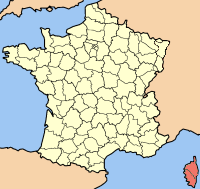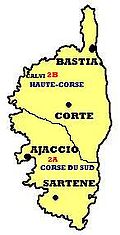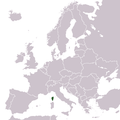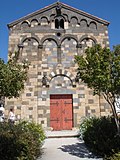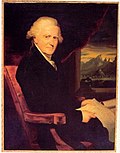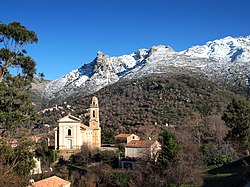Corsica
Corsica is the fourth largest island in the Mediterranean Sea (after Sicily, Sardinia, and Cyprus). It is west of Italy, southeast of France, and north of the island of Sardinia.
Corsica is one of the administrative regions of France.
Corsica is famous for its tourist attractions, and as the birthplace of Napoléon Bonaparte.
Geography
Corsica has 1,000 km of coastline and more than 200 beaches, and is very mountainous, with Monte Cinto as the highest peak at 2706m and 20 other peaks of more than 2000m.
Big towns: (Corsican names)
Other towns and villages:
- Saint-Florent (San Fiurenzu)
- Calvi (Calvi)
- L'Île-Rousse (Isula Rossa)
- Porto-Vecchio (Porti Vechju)
- Bonifacio (Bunifaziu)
- Aleria
The land and weather
Corsica is the most mountainous Mediterranean island. The low ground has a Mediterranean climate. Summers are hot and dry. Winters are mild with moderate rainfall. The climate of the high ground is cold and is wetter. The natural vegetation is Mediterranean forests, woodlands, and shrubs. The mountains are rich of forests of oak, and pine, except for the high ground. Much of the coastal lowlands has been cleared for agriculture, which has reduced the mountain forests considerably. The island has a natural park (Parc Naturel Régional de Corse), which protects thousands of rare animal and plant species. The park was created in 1972 and includes the Golfe de Porto, the Réserve Naturelle de Scandola (a UNESCO World Heritage Site), and some of the highest mountains on the island. This park is protected.
History
- 725 : Lombards settle in Corsica
- 754 : Carlo Magno, becomes king of the Lombards, and gives the lands of Corsica to the Pope.
- 1077 : The Pope Gregorio VII gives to an important priest of Pisa,the power for change or help things in Corsica.
- 1133 : Orders of priest separate itself in two parts, one for Genoa, and one for Pisa
- 1195 : A group of Genoa's soldier come in Bonifacio
- 1268 : A group of Genoa's soldier come in Calvi
- 1284 : Corse became property of Genoa
- 1383 : fondazione di Bastia da Genuva
- 1551 : Samperu Corsu attacks the Turks for France
- 1559 : Trattatu di Cateau-Cambrésis, Corsica is taken back by Genoa
- 1725 : Pasquale Paoli born
- 1730 : in December, Corsica is Independent
- 1732 : Peace of Corti
- 1735 : first constitution of Corsica
- 1736 : Teodoru di Neuhoff became the King of Corsica
- 1737 : Versailles meeting between France and Genoa
- 1755 : 14 July, Pasquale Paoli became "generale di a Nazione" by the court of Orezza
- 1755 : second constitution of Corsica written
- 1765 : University of Corti is open.
- 1768 : 15 May, at the "meeting of Versailles", Genoa sells Corsica to the French. Corsica attacks France.
- 1768 : 9 October, soldiers of Pasquale Paoli, a freedom-fighter, won a battle against the French soldiers, during the battle of "U Borgu".
- 1769 : 9 May, Corsica loses in the battle of "Ponte Novu" against the French soldiers.
- 1769 : 13 June, Pasquale Paoli, leaves Corsica for Great Britain after France beats him in battle.
- 1769 : 15 August, Napoléon Bonaparte was born in Ajaccio
- 1789 : France says that "Corse is part of the French kingdom"
- 1790 : Becomes the "dipartimentu" of Corsica, with Bastia as the capital.
- 1793 : Corsica is separated in two parts, a part of "Liamone" and the part of "Golu"
- 1807 : Pasquale Paoli dies
- 1821 : Napoléon Bonaparte dies on the island of Saint Helena
- 1840 : travel of Prosper Mérimée on Corsica
- 1858 : 4 August, French becomes the official language of Corsica
Administration
The capital of the territorial collectivity of Corsica is Ajaccio (Corsican: [Aiacciu] Error: {{Lang}}: text has italic markup (help)). The territorial collectivity is divided in two départements: Corse-du-Sud and Haute-Corse. These two départements were created on September 15, 1975 by the département of Corse.
Economy

Tourism is the biggest source of Corsican economy. The island has a pleasant climate, beautiful mountains and really beautiful coastlines that make it a popular destination among the French and other Western Europeans. However, the island has not had the same level of intensive development as other parts of the Mediterranean. Tourism is particularly concentrated in the area around Porto Vecchio and Bonifacio in the south of the island and Calvi in the northwest.
Politics
Corsica is currently governed almost as any other région of France. There are lots of movements on the island the independence of Corsica and of Corsicans from France. The French government is against full independence. There is support on the island for to have more autonomy, but polls show that a large majority of Corsicans are opposed to full independence. Some groups who claim to support Corsican independence have carried out a violent campaign since the 1970s that includes bombings and a few accidental assassinations, usually against pieds-noirs and other non-Corsicans, or buildings of the French government. Corsican independence groups attack when they are sure there won't be a danger for victims. However, not all groups for independence has "nice treaties", Sometimes independence groups are known to practice extortion and other intimidatory tactics, similar to mafia activity in Sicily and southern Italy. Non-Corsican homeowners may be threatened with the destruction of their home, or they are constrict to pay a "revolutionarian tax",for to help the groups in the attacks.
In 2000, Prime Minister Lionel Jospin agreed to give more autonomy to Corsica but just for stopping the violence. The propose of autonomy for Corsica would have included greater protection for the Corsican language (Corsu), the island's traditional language (which is also considered to be a dialect of Italian). However, the plans for increased autonomy were opposed by the Gaullist opposition in the French National Assembly. In a referendum on July 6,2003, a narrow majority of Corsican voters opposed to the project from the government of Jean-Pierre Raffarin and Interior Minister Nicolas Sarkozy that would have suppressed the two départements of the island and granted more autonomy to the territorial collectivity of Corsica.
"U Corsu", language of Corsica
In Corsica the official languages are Corsican and French. Corsu shares some similarities with Tuscan dialects (with their accents) or to Gallurese language, spoken in the nearby island of Sardinia. Corsu has two varietes, "Supranacciu", common in the northeast of theisland, (Bastia, Corte), and the "Suttanacciu" common in the south of the island, (Ajaccio, Sartene). The native Corsican language is closer to Italian than French, but both come from Latin. The ancient Romans spoke Latin.
Sport
In Corsica, football is a very common sport. The island has in the first league of France ('Ligue 1'), 2 teams. The AC Ajaccio and the SC Bastia. Another very famous sport in Corsica, is volleyball, with the GFCO Ajaccio Volley-Ball' team.
Corsica Media
Lhymne Corse - Dio Vi Salvi Regina
Carthage and its dependencies in 264 BC
The Romanesque-Pisan style of the Church of Aregno
The Barbary pirates frequently attacked Corsica
A view of Corsica and Martello tower, 1788 painting "A cutter and a man of war off Corsica" by Nicholas Pocock
Saint-Nicolas church in Feliceto
Notes
Other websites
| Wikimedia Commons has media related to Lua error in Module:Commons_link at line 62: attempt to index field 'wikibase' (a nil value).. |
- PhotoGlobe - Corsica A collection of photos of Corsica together with GPS-based positions
- CNN coverage of rejection of autonomy proposals in 2003 Archived 2008-04-08 at the Wayback Machine
- University of Corsica
- Corsica travel information at Wikivoyage
- Example of Corsican village Archived 2013-03-06 at the Wayback Machine

